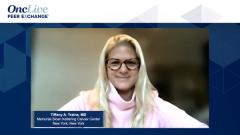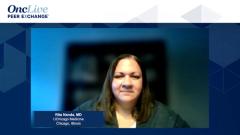
G-CSFs for Chemotherapy-Induced Neutropenia
Breast oncologists react to the availability of granulocyte colony-stimulating factors, used as prophylaxis against chemotherapy-induced neutropenia.
Episodes in this series

Hope S. Rugo, MD, FASCO: When I was initially training, and Bill can probably comment on this as well, patients used to get mouth sores all the time with doxorubicin cyclophosphamide. It was just a standard part of every 3-week AC [doxorubicin hydrochloride, cyclophosphamide].
We hardly see it at all anymore. It’s all about growth factors, and it was the same with transplants. Bill, do you want to comment? What are the symptoms you’re used to seeing now or in the past?
William J. Gradishar, MD: We see fewer symptoms than you just described. That’s largely because of supportive care measures that we employ. They’re not perfect, but we’ve become better at supporting patients after getting chemotherapy. The most common symptoms we see are the sequalae from the chemotherapy, low-grade fevers, or flu-like symptoms. The typical adverse effects that would have been more common at the early part of our careers are infrequent. I know we’re leading up to this, but there are patients who can still experience profound neutropenia in the immediate period after chemotherapy before their blood counts recover. There are a fraction of patients where that can result in catastrophic events. But some of the common things are not so common anymore.
Hope S. Rugo, MD, FASCO: It’s interesting. We even saw from TAC [docetaxel, doxorubicin hydrochloride, cyclophosphamide] chemotherapy, for example, in the very early days, typhlitis was life-threatening and really scary. I can’t think of anything like that with the more aggressive use of growth factors.
Interestingly, things have changed so much that we have a greater understanding of the risks of neutropenia. The use of growth factors varies a lot depending on the regimen you’re using and the patient population. Do you proactively treat everybody the same way? What are you giving? I’ll give you an example: is there something that we give that seems to be in a gray area, such as docetaxel and cyclophosphamide. Do you routinely use growth factors, Tiffany?
Tiffany A. Traina, MD: It’s funny you mentioned typhlitis. I recently had an experience with a patient in her late 60s who had docetaxel and cyclophosphamide in the adjuvant setting. After her first cycle, she was hospitalized with neutropenic colitis. So I’m very sensitive to those risk factors they mentioned and employing the use of a growth factor as prophylaxis if they have 1 of those high-risk features.
Hope S. Rugo, MD, FASCO: What risk factor do you use for TC [docetaxel, cyclophosphamide]if you do give 1?
Rita Nanda, MD: I do prophylactically administer a growth factor, and I tend to use a long-acting 1 in that case. When the regimen was first used, in the early days it wasn’t routinely instituting prophylactic growth factors, and I had a number of patients admitted with neutropenia.
Hope S. Rugo, MD, FASCO: Me too.
Rita Nanda, MD: I have absolutely incorporated it into that regimen.
Hope S. Rugo, MD, FASCO: Bill, do you do anything different with those patients? Do you still use pegfilgrastim?
William J. Gradishar, MD: Yes, we do. With TC [docetaxel, cyclophosphamide]we do. With AC [doxorubicin hydrochloride, cyclophosphamide], we do every other week. . Weekly Taxol, we don’t. We don’t use TAC [docetaxel, doxorubicin hydrochloride, cyclophosphamide]—I don’t even remember the last time we did. But there are still regimens where it’s necessary for growth factor support to be part of the routine algorithm.
Hope S. Rugo, MD, FASCO: Then if you give weekly chemotherapy in the metastatic setting, this is palliative, so it’s an interesting question about whether you use growth factors or just wait on the chemotherapy. I tend to use growth factors to keep them on schedule in part because they do better and secondly because it’s a nightmare to reschedule everybody all the time. Sometimes we’ll change schedules to every other week or something like that. Is that your approach?
William J. Gradishar, MD: As I said, in the metastatic disease setting, certainly when you’re into farther lines of therapy, your focus is shifting a little more toward palliation and the rigidity of staying absolutely on schedule, so it becomes a bit more liberalized. I guess in that situation we do use the creativity of oncology, and the schedules may be a little looser.
Tiffany A. Traina, MD: I’ll add to what Bill said in terms of the weekly regimens where you can’t use a long-acting growth factor. There’s a real inconvenience aspect on self-injection or having to come into the clinic for daily growth factor injection. In the palliative setting, that’s not where I want my patients spending their time. I don’t want them to be in the hospital or the clinic. I’m with Bill, adjusting schedules and doses perhaps a little more liberally in that setting.
Rita Nanda, MD: Yeah, I agree. In the advanced cancer setting, it’s not curative. It’s all about quality of life and extending life and palliating symptoms. Consequently, I have a different approach in that setting. That being said, if I have patients who’ve been on chemotherapy drugs that generally aren’t associated with needing growth factor but they needed it, then a lot of times I will preventively use it when they move on to subsequent lines of therapy. If I knew they struggled with weekly paclitaxel or something, then I’m planning on giving them sacituzumab. There are cases in which I’ll even preventively use it in the advanced cancer setting, particularly for patients who have a heavy disease burden and have struggled with therapies that most people don’t struggle with in the past.
Hope S. Rugo, MD, FASCO: That’s a great point: we use patient-associated risk factor, so it’s not just their size and age but their prior experiences that play a really big role.
Transcript edited for clarity.




































